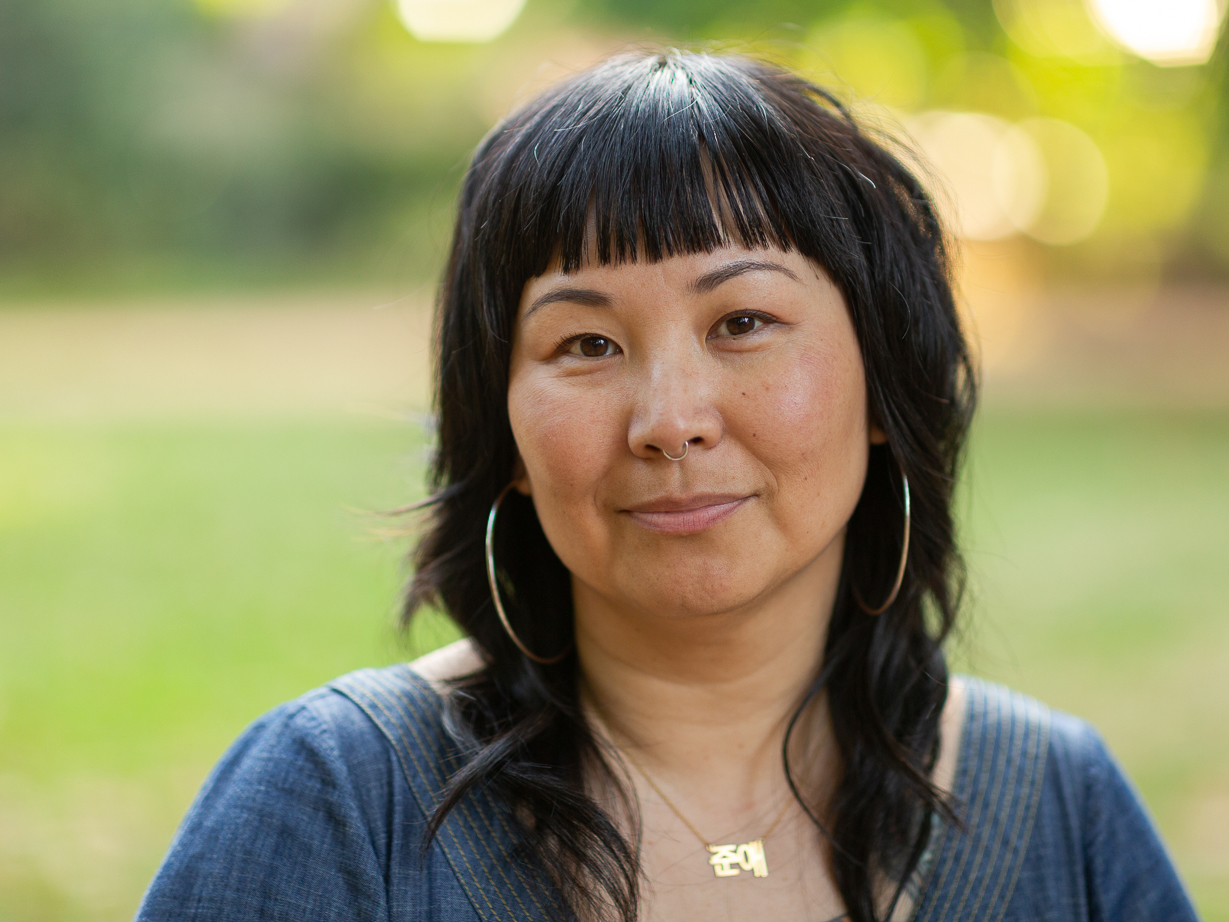Like many transracial and transnational adoptees, Joon Ae Haworth-Kaufka has undergone a long and arduous journey toward self-discovery.
According to their birth certificate, Haworth-Kaufka (she/they) was born on July 8, 1976, in Seoul, South Korea. They were two months old when they arrived at the adoption agency and six months when given to their adoptive parents—evangelical Christians living in Detroit, Mich. Haworth-Kaufka recalls their childhood with intensely mixed emotions, explaining, “Many adoptees say we don’t necessarily get a better life, we just get a different life.”
For Haworth-Kaufka, a “different life” manifested in a peaceful suburban community with many playmates. However, these were the same playmates who made them extremely aware of their differences: “One of the conflicts of being a transracial adoptee in that time [was] you get the racism from the people you love the most.” They recount their classmates shouting, “Ching chong, ching chong!” as they crossed the street, or their best friend telling them that their face was the size of the moon.
Their adoptive parents were an additional source of relational tension. Where their father was physically present but emotionally absent, their mother was an intensely involved—and complicated—figure in their life. Haworth-Kaufka recalls how, while grocery shopping, strangers would stop the family to ask about them and their sister—also an adoptee from South Korea with severe physical and intellectual disabilities. “Look at these little China dolls. How much did they cost?” Haworth-Kaufka recites. “And my mom just ate it up. We were always this little show-and-tell.”
These tense relationships led Haworth-Kaufka to repress many of their questions regarding their identities as an adoptee and Korean person—but not to prevent them from exploring other aspects of themself. “I knew I was different, so I kind of just went, ‘F– it!’” They paint a vivid portrait of their high school self as someone who dyed (then shaved!) their head, snuck out of class, and embraced the punk/raver scene. Toward the end of high school, they and their friends began exploring inner-city Detroit—a turning point in their journey of self discovery.
“I found lots of different types of people: racial diversity, class diversity, gender and sexuality diversity, and I was like—,” here, they feign a gasp, “—I’ve found my people!”
In the years after graduating high school, Haworth-Kaufka took community college classes in visual art, worked at local coffee shops, and spent time with increasingly diverse friends. At one point, their boyfriend-at-the-time wanted to go to the West Coast for work. So, at 21, they packed their few belongings and moved to Oregon, where they began attending Portland State. “Everything switched,” they say. “I met teachers who cared about me as a person, I fell in love with education, and I realized, ‘Oh. This is my way out.’”
Haworth-Kaufka spent the next decade immersed in education. They graduated with a Bachelor’s in English before going on to earn a Master’s in Conflict Resolution and an MFA in Creative Writing at Bowling Green State University. These led to tenure-track jobs at an HBCU in Greensboro, N.C., as well as Portland Community College, where they taught for many years before quitting to focus on more social-justice oriented work. Many of the skills gained during that period still influence their current involvements, whether it be creative fiction (they’re currently working on a novel about adoptee experiences), or the commercial real-estate company they manage with their partner supporting small, local businesses.
However, they didn’t begin investigating her own identities as an adoptee and Korean person until five years ago. “The adoptee community calls this ‘coming out of the fog,’ where you become aware of your identity as an adopted person,” they explain. During an argument with her adopted parents, whose political beliefs differ from their own, Haworth-Kaufka was struck with the realization: “I’m an immigrant!” They continue, “I didn’t know that I was an immigrant because I didn’t have an immigrant story like all the stories I’ve been reading. And that was a wake up call for me to dive into my experience as an immigrant from Korea.”
Thus began Haworth-Kaufka’s birth search, which unfolded much more quickly than anticipated. Within months, they’d found their biological mother—where she lived and details regarding her family. However, she requested a no-contact relationship with Haworth-Kaufka.
“That’s it,” Haworth-Kaufka states simply. “That’s all I know.” Because this happened during the pandemic, Haworth-Kaufka admits they haven’t fully emotionally confronted these developments. However, they inspired them to finally explore their identities as an adoptee and Korean person. Currently, they manage a number of nonprofits centering these communities, including VOICES, an organization uplifting the stories of and building community for BIPOC adoptees, and Yeondae, a social justice collective of Asian adoptees. These involvements have given them access to fellow transracial, transnational adoptees with whom to share their experiences.
They are also actively working to incorporate these identities into their family to ensure their three daughters don’t also miss out on Korean culture. “Learning language, learning how to cook, learning history, all these things that I would’ve naturally learned from my Korean family has been so much labor,” they acknowledge. “But now I’m deeply immersed in the Korean community.”
Currently, Haworth-Kaufka does not speak to their adopted family, and they’re unsure whether that will change in the future. “It’s a burden and a weight that I carry with me constantly,” they admit. However, they stress the need to uplift more diverse adoptee narratives—including those that aren’t as optimistic—and the importance of the general population—especially parents considering adoption—to educate themselves about the adoption industry. “I’m an abolitionist,” they state firmly. “Family separation occurs because of poverty, and I want people to work towards new systems that eliminate family separation.”
As for the future, Haworth-Kaufka says, “We are in the midst of a resurgence. Adoptees are finally telling their stories, and people are finally understanding that BIPOC adoptee stories are intersectional justice issues. I have a lot of faith in the future for adoptees.”

